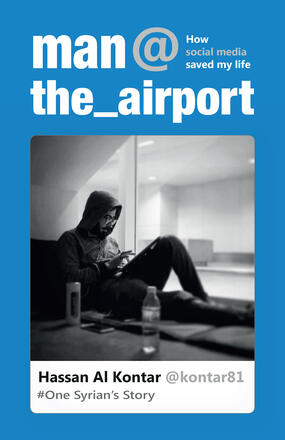
Man at the Airport
How social media saved my life - one Syrian's story
Description
When revolution and war broke out in his home country in 2011, Hassan Al Kontar was a young Syrian living and working in the UAE. A conscientious objector, he refused to return to Syria for compulsory military service and lived illegally before being deported to Malaysia in 2017, where he was stranded at the airport for seven months. This book explores what it means to be a Syrian, an “illegal” and a refugee as well as the power of social media to facilitate political dissent.
Reviews
@kontar81
When revolution and war came to Syria in 2011, Hassan Al Kontar was living and working in the UAE. His refusal to return to Syria for compulsory military service was a decision that changed the course of his life. With an expired passport and work visa, Al Kontar was forced to live for years as a homeless “illegal” before being deported to Malaysia in 2017. There, unable to obtain a visa for any other country, he was stranded in the arrivals zone at Kuala Lumpur International Airport. Exiled by war and trapped by geopolitics, Al Kontar turned to social media, using honesty and humour to tell his story to the world. His tweets, posts and videos went viral, leading to mainstream media celebrity and, ultimately, escape from his airport prison.
"Man at the Airport is a testament to the power of one man’s quest for asylum, and how social media has the ability to harness that power – but this book is much more than that. It’s a window into Hassan Al Kontar’s ingenuity, resilience, and determination not to be drawn into the war in his homeland . . . [It] has a musicality all of its own, sung to us with honesty, grace, and astonishing courage." SHENIZ JANMOHAMED, Quill & Quire
"This is the fascinating survival story of a migrant worker who, falling victim to geopolitical forces beyond his control, ends up in stateless limbo and is forced to rely on instinct, intelligence, and fortitude — plus the kindness of strangers — to avoid the grim prospect of returning to his homeland . . . Once I opened Al Kontar’s highly readable and deeply affecting memoir, I finished it in a couple of sittings." DANIEL GAWTHROP, The British Columbia Review.
"Al Kontar is a wonderful young man with a wise old soul. He is also a gifted storyteller telling important truths in a hugely readable style." PAUL BLEZARD, LoveReading UK
"Man at the Airport is a testament to the power of one man’s quest for asylum, and how social media has the ability to harness that power – but this book is much more than that. It’s a window into Hassan Al Kontar’s ingenuity, resilience, and determination not to be drawn into the war in his homeland . . . [It] has a musicality all of its own, sung to us with honesty, grace, and astonishing courage." SHENIZ JANMOHAMED, Quill & Quire
"This is the fascinating survival story of a migrant worker who, falling victim to geopolitical forces beyond his control, ends up in stateless limbo and is forced to rely on instinct, intelligence, and fortitude — plus the kindness of strangers — to avoid the grim prospect of returning to his homeland . . . Once I opened Al Kontar’s highly readable and deeply affecting memoir, I finished it in a couple of sittings." DANIEL GAWTHROP, The British Columbia Review.
"Al Kontar is a wonderful young man with a wise old soul. He is also a gifted storyteller telling important truths in a hugely readable style." PAUL BLEZARD, LoveReading UK